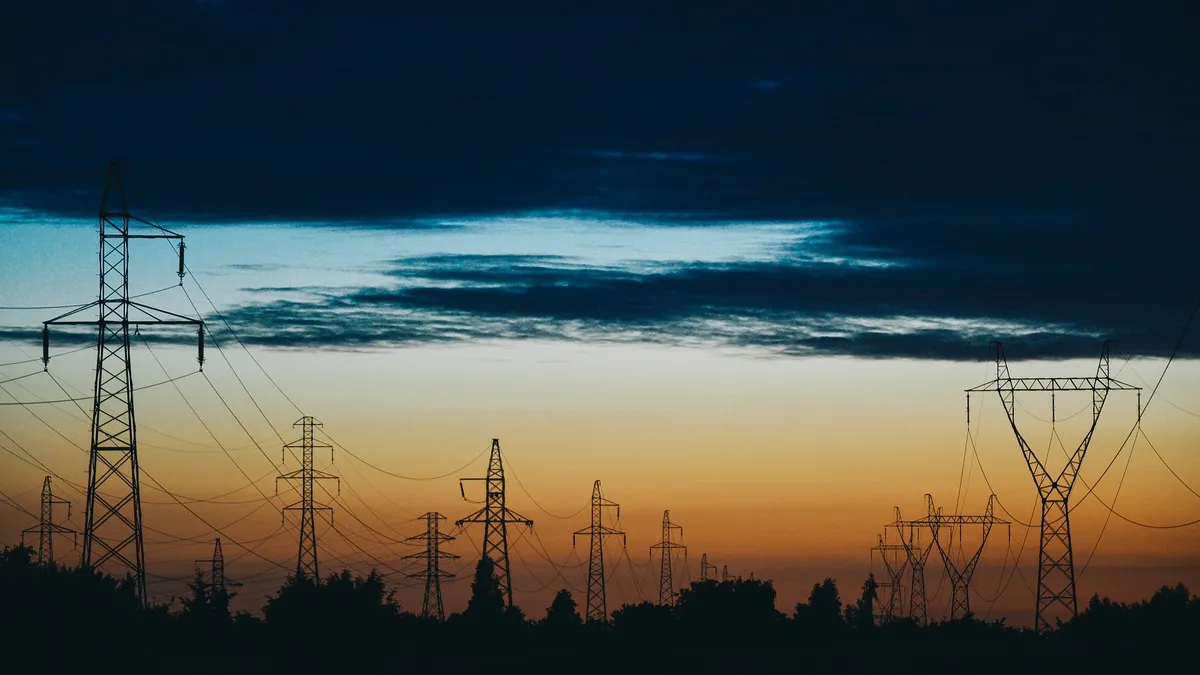Dive Brief:
- ISO New England's 14th annual Forward Capacity Market (FCM) auction on Monday closed at $2/kW-month, representing the lowest price in the program's history and an almost 50% drop compared with the $3.80/kW-month in last year’s auction.
- The auction resulted in commitments from 33,956 MW of energy capacity to be available in 2023-2024. A total of 42,219 MW, including 516 new resources totaling 7,314 MW, qualified to participate in the FCM.
- More solar and energy storage resources could have been available to participate, but confusion over federal and state interconnection procedures kept more than a dozen projects from participating
Dive Insight:
ISO New England officials say the auction produced record low prices but more than a dozen projects that had hoped to compete were not allowed to participate, leaving their development status in flux.
The Federal Energy Regulatory Commission (FERC) on Feb. 3 denied a waiver to participate in the auction requested by asset management company Genbright, after 14 projects were deemed to have missed a key qualification deadline.
Genbright had hoped to bid 18 projects into the FCA14, but Massachusetts utility Eversource determined developers had used the state interconnection process when in fact FERC had jurisdiction. That determination resulted in those projects missing a Show of Interest deadline in April 2019.
Ultimately, Genbright received a waiver in December for four projects to participate in the auction when FERC found Eversource's determination for those was in error. Another 14 resources, consisting of seven solar and seven associated energy storage projects, were denied a waiver on Monday.
Genbright said claimed capacity for all 18 projects was 65.6 MW; the first waiver covered about 15 MW and the second rejected waiver covered about 50 MW.
It is not clear if other projects ran into similar issues, but Genbright's waiver request appears unique. In an email, an ISO spokesperson said that last year other resources were denied qualification in the FCA for failure to establish the appropriate interconnection request with the ISO.
"As far as we are aware, Genbright was the only entity that challenged the transmission company’s determination," the ISO told Utility Dive.
At issue is the process to determine whether the projects' interconnection points are under FERC jurisdiction.
Genbright officials say the first waiver request focused on projects that had been erroneously classified as FERC-jurisdictional. The second waiver claimed that Eversource should have made the determination sooner than it did, and the utility informed the ISO only days before the FCA qualification process ended.
Genbright says it is agnostic as to which process developers use, but warns there are likely to be higher costs and extended timelines associated with the ISO's Small Generator Interconnection Process (SGIP) compared with state interconnection processes. Genbright officials also say Eversource should have informed the ISO of its determination earlier, which would have allowed the grid operator to inform Genbright.
"It's not that we disagree about the lack of clarity around the jurisdictional issue, we just thought they should have told us earlier," William Pentland, Genbright vice president of regulatory strategy, told Utility Dive. "There is no real technical reason to use one process over the other. You essentially end up in the same place."
Eversource should have informed the developers that they needed to use the SGIP "within a reasonable time," Pentland said in an email. He added that in some cases, Eversource had the information it needed to make the jurisdictional determination several months in advance of the Show of Interest.
“We're focused on trying to work with the ISO to improve and streamline its interconnection process, to reduce costs so developers are not penalized," said Pentland. "Right now, we are trying to get a better line of sight on what process we need to use."
Eversource declined to comment for this story, but officials told Utility Dive that the utility does support the development of distributed generation, and has connected 1.3 GW of distributed energy resources to facilities in Massachusetts.
FERC ultimately denied Genbright's request for a waiver, concluding it was not limited in scope to correcting a one-time error.
"Genbright’s requested waiver would allow the Projects to avoid ISO-NE’s complex interconnection study process, including the system impact study, which is ISO-NE’s comprehensive reliability evaluation," the commission said in its order.
No one is disputing that the interconnection process is complicated.
Eversource, in a FERC filing opposing Genbright's waiver request, noted there is "perhaps no jurisdictional area more fraught with complication as the interconnection of DERs selling power for resale that are interconnecting to local distribution facilities."
Law firm Preti Flaherty said in a Feb. 4 blog post that the commission's decision to reject the waiver request "highlights the growing tension between state programs encouraging or requiring the development of distributed energy resources and federal jurisdiction."
The ISO's interconnection study process, the firm noted, "is indeed complex, and typically requires an applicant to wait through a lengthy queue of other study requests before their own study may begin, a process which can take months or longer."
ISO New England says it will take steps to clarify the process in the future.
"This is a complicated issue, especially as more DERs seek to interconnect to the system for retail as well as market participation purposes," the grid operator told Utility Dive in an emailed statement. "Going forward, we will be working proactively with the project sponsor and the respective distribution company/transmission owner to confirm the jurisdictional status of the distribution facilities and the applicable interconnection process early in the qualification process."
But the ISO added, "it’s up to the developers to confirm this, as the appropriate interconnection requests must be established by the close of the Show of Interest Window in order to participate in the auction."
Without access to market revenues for 2023-2024, Pentland said investors will now need to decide whether to delay the solar and storage resources. "How this affects the projects remains to be seen," he said.














